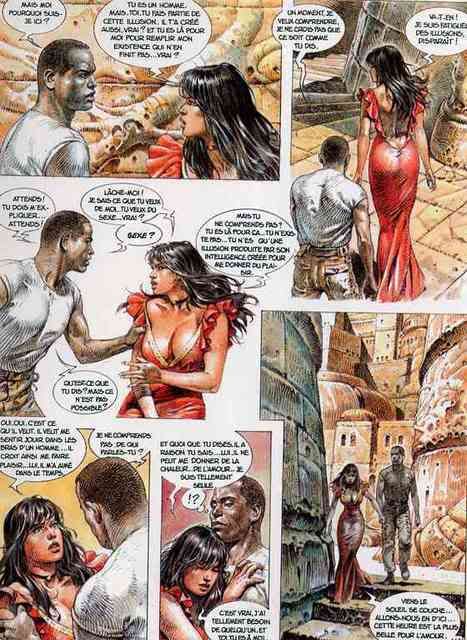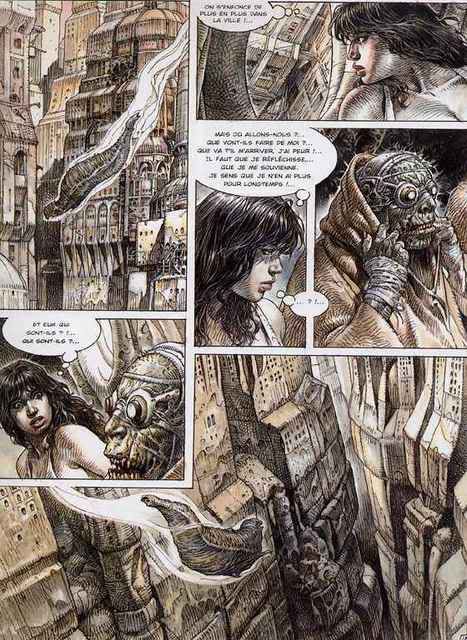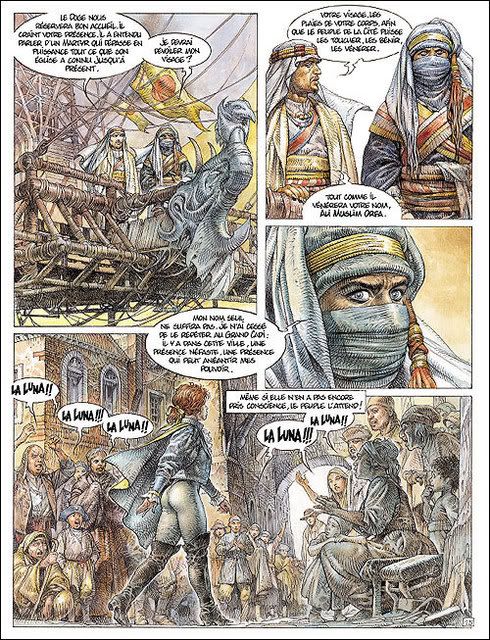"Do you enjoy flirting with pain, my little hedgehog?": Jog could have bought this off of any magazine rack around, 12/5 or not
/![]() And that's not even the best line to be found in the publication under review today, dear old Heavy Metal, which released a new issue to comics stores this week. No, the gold cup can only go to this fearsome remark, dropped by a street tough in the middle of a mugging:
And that's not even the best line to be found in the publication under review today, dear old Heavy Metal, which released a new issue to comics stores this week. No, the gold cup can only go to this fearsome remark, dropped by a street tough in the middle of a mugging:
"Be calm and in a few minutes you will have the possibility to stay on your own and do your oscene acts!"
Maybe I've just been oscenely spoiled by the proliferation of manga, but I do kind of expect a higher quality of translation these days, particularly from what's still a highly visible, accessible forum for European comics in English. Maybe the most visible. I'm not saying that all manga translations are great or anything, but I can't recall the last time I found myself tripping on the dialogue, or scratching my head over what was supposed to be happening on a given page because the words weren't quite matching the pictures. That still happens with the non-English portions of this magazine, and it's really too bad.
I will say that that story I got the above example from (Friends, by Davide Furno & Paolo Armitano) was noticeably worse than the rest of the issue, but even the other pieces manage clunkers like "Now we are going to have some. Nobody can jerk me around and get away with it!" Oh well. Anyway -
Heavy Metal (Jan. 2008): The main feature for this new issue, which is what I'll focus on, is the 62-page debut of a brand-new series from artist Paolo Eleuteri Serpieri, best known for the eight-volume Morbus Gravis series of sci-fi sex comics starring a young woman named Druuna.

Druuna, in case you're not a seasoned reader, doesn't always wear so much clothing. This may well be the key to her international success, although Serpieri's knack for detailed, fiercely hatched and scratched environments may hold its own appeal for admirers of realist fantasy illustration.

That's what's at the fore of Hell (Les Enfers). Written by Jean Dufaux (of the series Raptors and Dixie Road, both in English from NBM), the album does sort of fudge the Dirk Deppey test for quality in Heavy Metal licenses, in that the human naked breasts don't show until page 33, although demonic nudity is prominent by page 5. Accordingly, there's a good deal of story in place, although most of it amounts to scene-setting.
The plot concerns political and religious trouble in a fantasy Venice. A ruined old man passes away, but not before entrusting his young daughter with a sacred artifact the family stole a few heads ago: three magical keys, each of which will unlock the hidden door to the afterlife, but produce a unique result. One will open Paradise. One will reveal Hell. And one will lead to absolute nothingness, which doesn't sound like a great deal either.
Aided by the old man's servant, a long-haired dude with strange secrets and a desire to dress in a cloak and mask while out looking for trouble, Our Heroine grows up to be La Luna, champion of the common folk against the theocratic reign of Sancti Aura, "the right-wing inquisitors" (think they're villains?), led by her wicked uncle (a guy with wires sticking out of half his metal head with a flesh face stretched across the front), who also wants the keys. As does Galadriel, a chalk-white male/female demon who's supposed to be watching the sacred door, but mostly scowls and gets easily misled.
Oh, and for a little extra topical kick, the Catholic-type inquisitors are expecting Islamic-style guests for a holy/magical technological Great Duel for the hearts and minds of the citizenry. Uncle Robot's big trick is to rip off an index finger, fire delightful cartoon lightning into a hole, and summon Moloch, a nuclear(?) warhead with tentacles.
 (pardon the non-English illustration)
(pardon the non-English illustration)
It's all very flush and socio-political in that European-pop-comics-that-tend-to-get-licensed-by-Heavy-Metal way, and actually fairly intriguing. I suppose the problem is that Dufaux has so much premise to knock through, that the whole story seems like an extended prologue, with the cast's basic motivations just barely sketched in by the close, which makes me wonder how future volumes of the same length might deepen these individual characterizations without knocking the pace out of wack. It doesn't compare well with a similar religion/politics series from a famous Italian smutty artist also running in Heavy Metal - Borgia, by Alejandro Jodorowsky and Milo Manara, which has a way of blowing through years of history with exploitation verve and a deeper, more convincingly cynical take on human and divine affairs.
Still, we've got Serpieri, and he lavishes attention on what I can best describe as Renaissance-fascist decor amidst obsolete future tech, and his characters have a way of remaining expressive despite the heaviness of their detail. Well, save for La Luna herself, who sometimes seems lacquered like a piece of furniture in the Druuna tradition - it's more fitting to heap such gloss on the heroine's posture if you're doing a male-targeted sex comic, since she's the obvious focal point of everyone's attention anyway, but a story this involved with place needs plenty of grit to get on everyone. OKAY.











